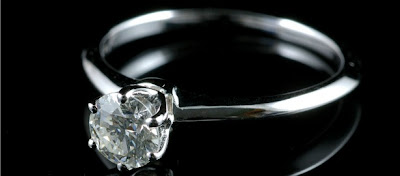From: Steven H.
Sent: April 5, 2012
To: undisclosed recipients
Subject: Fw: The meaning of the diamond engagement ring
Diamonds are forever, but the meaning of the diamond engagement ring has changed dramatically in the last century. Today's symbol of love was once something more like virginity insurance.
 |
| Norman Chan/Shutterstock |
Why do men buy diamond rings for our fiancées? There's the emotional story. We enjoy making grand gestures of commitment to the people we love. Behind that, there's the marketing story. DeBeers' historic ad campaign, crafted by the real-life mad men at N.W. Ayers, convinced generations of lovers that diamond bands were synonymous with eternal devotion. But behind that, there is economic story that is just as important and fascinating.
***
Once upon a time, diamond rings weren't just gifts. They were, frankly, virginity insurance.
A now-obsolete law called the "Breach of Promise to Marry" once allowed women to sue men for breaking off an engagement. Back then, there was a high premium on women being virgins when they married -- or at least when they got engaged. Surveys from the 1940s show that roughly half of engaged couples reported being intimate before the big day. If the groom-to-be walked out after he and the bride-to-be had sex, that left her in a precarious position. From a social angle, she had been permanently "damaged." From an economic angle, she had lost her market value. So Breach of Promise to Marry was born.
But in the 1930s, states began striking down the "Breach of Promise to Marry" law. By 1945, 16 states representing nearly half of the nation's population had made Breach of Promise a historical relic. At the same time, the diamond engagement ring began its transformation from decorative to de rigueur. Legal scholar Margaret Brinig doesn't think that's a coincidence, and she has the math to prove it. Regressing the percent of people living in states without Breach of Promise against a handful of other variables -- including advertising, per capita income and the price of diamonds -- Brinig found that this legal change was actually the most significant factor in the rise of the diamond engagement ring. It's historically plausible. The initial mini-surge in diamond imports came in 1935, four years before DeBeers launched its celebrated advertising campaign. What's going on here?
Let's think like an economist. An engaged couple aren't all that different from a borrower and a lender. The woman is lending her hand in marriage to the man, who promises to tie the knot at a later date. In the days of Breach of Promise, the woman would do this on an unsecured basis -- that is, the man didn't have to pledge any collateral -- because the law provided her something akin to bankruptcy protection. Put simply, if the man didn't fulfill his obligation to marry, the woman had legal recourse. This calculus changed once the law changed. Suddenly, women wanted an upfront financial assurance from their men. Basically, collateral. That way, if the couple never made it down the aisle, she'd at least be left with something. And that something was almost always small and shiny. The diamond ring was insurance.
So, should a jilted bride give back the engagement ring? Today, the answer is often yes. But back when rings first came into vogue, part of the point was that she wouldn't. It was a security against a default on the engagement. The good news is that this seems so alien to us today. Women have their own careers. They earn more degrees. And, for the younger generation, they out-earn men. More importantly, the stigma against premarital sex has disappeared. A broken engagement isn't a lasting financial disaster for a woman like it was before. The diamond engagement ring has itself undergone a transformation. It's no longer a security. It's just about signaling nowadays. It's anachronistic. But don't try telling your girlfriend that.


No comments:
Post a Comment
Don't be shy. Leave a comment below and tell the world what you think.